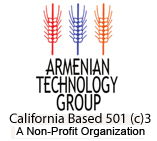Nor Gyank -- Rural Armenians Benefit from Wheat Project
July 13, 2005
Nor Gyank, Province of Shirak, Armenia — As darkness fell on the fields surrounding Nor Gyank, a village near Artik in northern Armenia, local farmers and agronomists from the Yerevan office of the Armenian Technology Group (ATG) worked feverishly to complete preparations for planting a promising variety of wheat new to the Armenian countryside. With rain impending, workers removed the seed left in the planter from the previous planting, using flashlights and the headlights from two Niva jeeps to aid in their work. Seeding rates were set, and the planting began.
The work in Nor Gyank is part of the continuing effort by ATG professionals to strengthen the economy of rural Armenia by making farmers competitive in today’s marketplace. To ensure the success of this program, ATG established the Seed Producers Support Association (SPSA). In the program, SPSA growers produce high quality first-generation seed and guarantee Armenian farmers access.
Gagik Mkrtchyan, executive director of SPSA, believes Armenian agriculture should take into consideration market demands, especially in new wheat and grain varieties. “In Nor Gyank, we planted one-half hectare of a new wheat variety we obtained from CIMMYT, an organization that develops new varieties of wheat and studies how they grow in various climates,” he said. “It is one of the most promising new varieties I’ve seen. The harvests are high, and it makes great lavash.”
The variety, brought to Armenia in a very small quantity in 1998 by ATG US agronomists cooperation with CIMMYT, and after several years of adaptation process, has been officially registered in Armenia as ATGF 35-16. “Last fall, we planted this variety in experimental plots all over Armenia,” Mkrtchyan said. “In high elevations, like here in Nor Artik, ATGF 35-16 grows fast, and seems to be frost-resistant. We have high hopes for this variety.”
Developed in Sonora, Mexico, ATGF 35-16 can be sown in both autumn and spring. “Demand for the variety made it necessary to multiply the seed, so we can make it available to SPSA growers and eventually to wheat farmers throughout Armenia,” Mkrtchyan explained. “We are grateful that Nor Gyank farmer Araik Sukiasyan, whom we have worked with since 1994, set aside this plot for our project. The land was in perfect condition. This will help us reach our goals in seed multiplication of ATGF 35-16.”
Experimental plots test new varieties
In the 2004 fall planting season, SPSA agronomists planted 24 varieties of wheat and barley in19 experimental plots in wheat-producing regions across Armenia. Some varieties were planted twice, to study the relationship between the timing of sowing and the resistance to frost. After assessing each variety, those that prove successful will be planted on 1,000- square-meter plots for further testing and seed multiplication.
On April 14, the day of the sowing in Nor Gyank, Mkrtchyan, Armen Asatryan, and Vaghinak Karmrastyan of SPSA planted varieties of spring wheat and barley in experimental plots in Garnoot, Voghchi, and Meghrashen, villages in the Shirak region. “We planted three varieties of barley and three of wheat,” Karmrastyan said. “Besides ATGF 35-16, we planted two new varieties of wheat, Shirak 1 and Shirak 2. It is important to offer our farmers the best selection of spring wheat and barley, to help them stay competitive in the Armenian marketplace.”
That night in Nor Gyank, as the sowing began, Gagik Mkrtchyan and Vaghinak Karmrastyan rode on the planter to check the seeding rates and make sure the seed was spreading evenly. Satisfied, the men jumped down, and the tractor disappeared into the dark night. A light rain began to fall. “The rain is perfect,” Mkrtchyan said. “The seed will sprout better, more evenly. And if we hadn’t planted tonight, the field would have been too wet, and we would have lost several days.”
Mkrtchyan’s satisfaction and pride were evident. “Working together, using the best varieties and most up-to-date technology, we can help provide our farmers the means to support their families. In turn, this will strengthen the agricultural sector in the remote, outlying regions of our country.”
For more information about how you can help Armenia’s farmers, contact the ATG office at (559) 224-1000 or by e-mail (info@atgusa.org). Tax-deductible donations can be sent to ATG; 1300 E. Shaw, Suite 149; P.O.Box 5969; Fresno, CA 93755-5969.
You may also donate to ATG online.

Follow Us